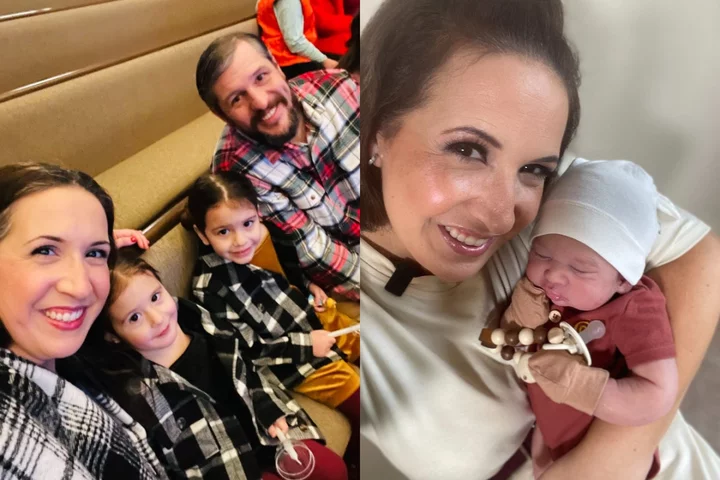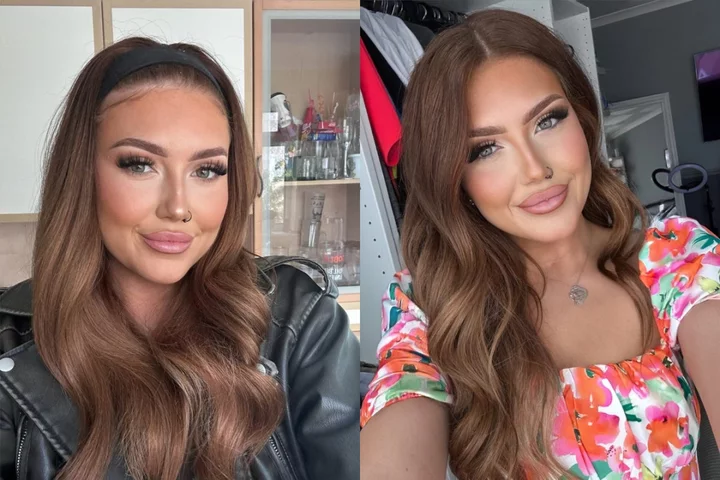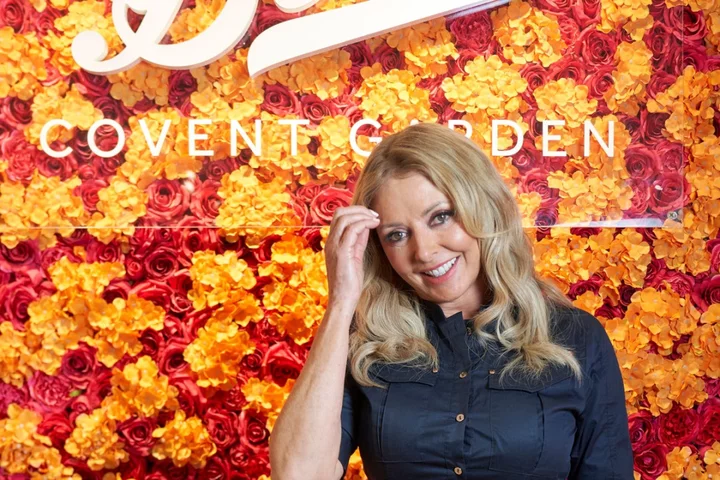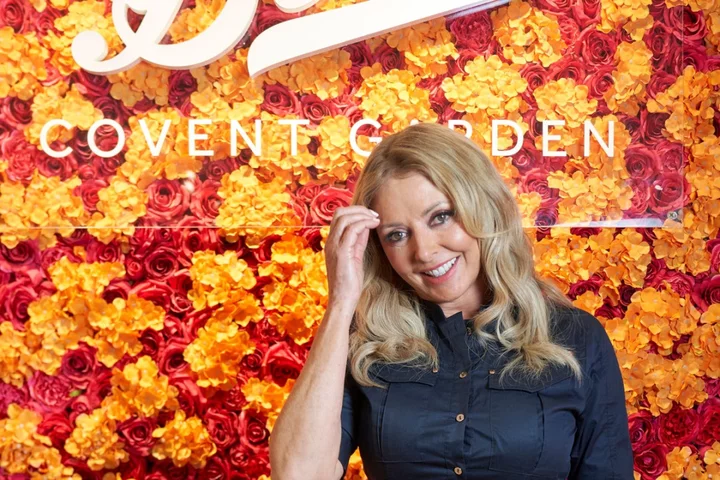
The bowel cancer symptom George Alagiah wished he’d caught earlier
BBC presenter George Alagiah has died at the age of 67, after nearly a decade of living with bowel cancer. The newsreader was first diagnosed in 2014. He underwent several rounds of treatment after the cancer returned and spread over the last few years. In a statement, his agent Mary Greenham said: “George fought until the bitter end but sadly that battle ended earlier today. George was deeply loved by everybody who knew him, whether it was a friend, a colleague or a member of the public. “He simply was a wonderful human being. My thoughts are with Fran, the boys and his wider family.” Earlier this year, Alagiah opened up about a symptom he wished he had caught earlier. He was taking part in an NHS campaign to encourage the wider public to take up its bowel cancer screening program. He urged people who have received a free test kit from the health service “not to ignore it” because it “could save your life”. “Had I been screened, I could have been picked up. I would have been screened at least three times and possibly four by the time I was 58 and this would have been caught at the stage of a little polyp: snip, snip,” he said at the time. Alagiah received his diagnosis after complaining of blood in his stools. He underwent 17 rounds of chemotherapy and five operations to treat the disease, which eventually spread to his liver and lymph nodes. He supported a campaign by Bowel Cancer UK and Beating Bowel Cancer to make cancer screening available to everyone in England from the age of 50. Currently, screening is available to everyone aged 60 to 74, but the NHS is expanding to include everyone aged 50 to 59 years old. Around 42,000 people are diagnosed with bowel cancer every year in the UK, with 90 per cent of diagnoses made in people over the age of 50. It the fourth most common cancer and the second biggest cancer killer, leading to around 16,800 deaths every year. The three main symptoms of bowel cancer include having persistent blood in the stools; an ondoing change in bowel habits, such as needing to go more often or having diarrhoea; and persistent lower abdominal pain, bloating or discomfort. Some patients may also experience a loss of appetite, or significant, unintentional weight loss. According to Cancer Research UK, another potential symptom is tenesmus, which is the feeling of having to defecate without having stools, or experiencing pain upon defecation. Studies have found that several factors could potentially increase the risk of bowel cancer, although they cannot explain every case. These include a diet high in red or processed meats and low in fibre; being overweight or obese; not exercising often enough; and drinking too much alcohol. Smoking and having a family history of the disease can also increase the risk. Some people with long-term conditions like extensive ulcerative colitis or Crohn’s disease may also have an increased risk of bowel cancer. Bowel cancer can be treated with surgery, which may be paired with chemotherapy, radiotherapy or biological treatments. Catching the cancer at an early stage greatly improves chances of survival. However, the NHS states that if a cancerous tumour cannot be removed completely through surgery, then a cure may not be possible. For more information about treatment for bowel cancer, visit the NHS here and Cancer Research UK here. To speak to a Cancer Research UK nurse, you can call 0808 800 4040. The helpline is free and open from Monday to Friday, from 9am until 5pm. Additional reporting by PA Read More George Alagiah death: BBC newsreader dies aged 67 after bowel cancer diagnosis ‘One of the best and bravest’: George Alagiah obituary as long-serving BBC newsreader passes away ‘It’s not the doom and gloom you might think’: Jonnie Irwin details experience with palliative hospice care
1970-01-01 08:00

George Alagiah: What are the signs of bowel cancer?
BBC newsreader George Alagiah has died at 67 after being diagnosed with bowel cancer. Bowel cancer is the fourth most common cancer in the UK and leads to around 16,800 deaths every year. More than nine out of 10 cases of bowel cancer develop in older adults over the age of 50, and nearly six in 10 are in people aged 70 or older. Alagiah was first diagnosed with stage four (advanced) bowel cancer in 2014. By the age of 66, it had spread to his lungs, liver, spine and lymph nodes. The three main symptoms of bowel cancer are having persistent blood in the stools, an ongoing change in bowel habit (such as needing to go more often or suffering the runs) and persistent lower abdominal pain, bloating or discomfort. A loss of appetite may also occur, or somebody may suffer significant, unintentional weight loss. Several things are known to increase the risk of bowel cancer, though they cannot explain every case. These include a diet high in red or processed meats and low in fibre, being overweight or obese, not taking enough exercise and drinking too much alcohol. Being a smoker and having a family history of the disease can also push up the risk. Some people also have an increased risk of bowel cancer because they have another long-term condition, such as extensive ulcerative colitis or Crohn’s disease. Bowel cancer screening is currently widely offered to people aged 60 to 74 who are sent a home stool kit every two years. Those aged 75 and over can ask for a kit every two years by phoning the free bowel cancer screening helpline on 0800 707 60 60. Bowel cancer can be very difficult to treat in its later stages. But in the early stages, tumours can often be removed through surgery. The main treatments for bowel cancer include chemotherapy, radiotherapy and targeted drugs, which depend on the genetic make-up of the tumour. One in 15 men and one in 18 women will be diagnosed with bowel cancer during their lifetime. Expert predictions are that 53,646 cases of bowel cancer (29,356 in men and 24,290 in women) will be diagnosed in the UK in 2035. Read More Charity boss speaks out over ‘traumatic’ encounter with royal aide Ukraine war’s heaviest fight rages in east - follow live Carol Vorderman says she no longer sunbathes after health scare Carol Vorderman: Why my skin cancer scare means I no longer sunbathe This is how often you should actually change your razor
1970-01-01 08:00

Mum’s husband fired from family business after she roleplayed with reborn dolls
A woman who turned to roleplaying with hyper-realistic dolls “to help (her) cope” with the death of her first baby – and continues to do so with her husband and two rainbow babies – has said her husband’s parents disapproved of the hobby and fired him from the family business as a result. Christina Keeler, 38, a stay-at-home mum and YouTuber, from Wyalusing, Pennsylvania, USA, fell pregnant with her first “miracle” baby in 2015, despite having endometriosis and being told she would not be able to conceive in her 20s. She suffered a miscarriage, but after watching a documentary about so-called reborn dolls, she had a “lightbulb moment” and realised getting a hyper-realistic doll would be the “perfect solution”. Christina’s husband Bill, 43, was “hesitant” at first but became supportive after he saw how much it “helped (her) grief”. The couple went on to have two “miracle” daughters, Grace, six, and Joy, four, who now help feed, change and dress the family’s five reborn dolls – which cost between £1,560 and £3,899 each – in their “nursery” complete with “a crib and a wardrobe”. The family often take the dolls out in public, and have shared their journey on YouTube – where Christina documents people’s reactions to her dolls and birthing videos. Some silicone dolls come in a fake womb which allows a Caesarean section to be performed at home. But Bill’s family were “disgusted” with the hobby, to the point where they gave him a choice to stop having the dolls or leave the family business. He refused to shut down the YouTube channel and did not want Christina to give up her hobby, so he was fired. She fell pregnant with her first baby in 2015, a year after her mother died of cancer. The couple were “elated” about the pregnancy because Christina had been told in her twenties that she would not be able to conceive because she has endometriosis, but she miscarried at eight weeks. Christina told PA Real Life: “When we lost the baby it was so devastating, I remember lying in the hospital bed after they had taken the baby out of my belly, and screaming for my mum and wept wanting to cuddle my baby.” She “really struggled” with the grief of losing her mother and her baby so close together. She explained: “This feeling of sorrow just never went away, it was so painful that I never talked about it again.” Despite having her two “miracle” children Grace and Joy, Christina still longed to hold her first baby, and after watching a documentary about reborn dolls, she wanted to get one to see if it would help her grief. She said: “I felt so blessed to have two healthy girls, but that feeling of missing the first baby never quite went away. “When my youngest was around two years old, my husband and I came across a documentary about reborn dolls. “And he was like, ‘That’s really weird’, and I played it off that I thought the same, but actually I really wanted one to help me cope and I thought it would be the perfect solution.” After persuading her husband, Christina ordered her first lifelike doll, Hannah, costing her around £155. She said: “I told my husband and he was not on board at all, he was hesitant, but after explaining my reasoning, he was much more understanding and more accepting.” When the doll arrived, Christina instantly felt like it helped with her mourning. She said: “It helped me therapeutically because for the first time ever when I got my first reborn doll, I was able to talk about the loss of our baby. “And since then I have healed tremendously from that loss because I’m able to talk about it and share my story and help others – it helped my grief, for sure.” Christina now has a collection of five dolls called Carter, Cadence, Quinn, Isabella and Sammy, which she loves to dress, cuddle and feed. She takes the dolls out in public and people often mistake them for real babies. She said: “We have a nursery for them with a crib and a wardrobe. I check on them throughout the day, and on other days, especially when the girls want to get involved, I pick out an outfit for them, bring them to breakfast, get them to feed them a bottle, change them. “If we’re running errands we often take them out with us and put them in a car seat and stroller.” Christina and her family have been sharing their experiences on YouTube, where they are known as The Reborn Family. She said: “I make videos about people’s reactions to my dolls, as well as vlogs and birthing videos – I have some silicone reborn dolls which come in a womb and you perform a C-section on it at home, to give birth to the baby.” Despite her immediate family being supportive of the hobby, Christina admits not everyone in her wider family understands. She said: “My husband’s family were, and still are, disapproving of the reborns, even though they can see how much they helped me. They were disgusted. “We moved from California to Pennsylvania because my husband was next in line to take over the family business because they were about to retire, and they asked if we would like to do so and we agreed. “When they were on vacation they came across our YouTube channel, and they called us up and they were mortified and so embarrassed, and said we were ruining the family name.” When Bill’s parents came home, they gave him an ultimatum to stop having the dolls. Christina explained: “Bill said that he was not going to quit his job, and didn’t want me to stop having reborns because they were so therapeutic for me at the time, and his dad said, ‘Well, then you’re fired’.” My husband’s family were disgusted, they said we were ruining the family name Bill’s father was contacted by PA Real Life for comment, but he had not responded at the time of publication. Even though her reborns have caused tension in the family, Christina cannot see herself giving up her hobby any time soon. She said: “Reborns continue to help me with my grief, and I love sharing content with other people who have lost babies, and they can also really help people with dementia, people who are infertile, people with anxiety and depression, I wouldn’t want to stop this.” Read More Teenager who thought she was pregnant diagnosed with ovarian cancer Woman praised for response to parents who asked her to swap first class seat with their child Barbie vs Oppenheimer: Greta Gerwig makes history with biggest box office opening for a female director Charity boss speaks out over ‘traumatic’ encounter with royal aide Ukraine war’s heaviest fight rages in east - follow live
1970-01-01 08:00

South Africa media guide
Overview of the media in South Africa, including links to broadcasters and newspapers.
1970-01-01 08:00

South Africa country profile
Provides an overview of South Africa, including key dates and facts about this African country.
1970-01-01 08:00

Teenager who thought she was pregnant diagnosed with ovarian cancer
A teenager who thought she was pregnant after her stomach unexpectedly became rounder, and who was told it was constipation by her GP, was later diagnosed with ovarian cancer and is now a student nurse after realising “life is too short”. Summer Edwards, 22, a student nurse at the University of the West of England, from Bristol, went from a size six to size 10 “in a matter of weeks” and thought she was pregnant in 2020, but her GP reassured her that it was constipation. After trying strong doses of laxatives and having two catheters fitted, nothing improved, and she was eventually diagnosed with an ovarian cyst which doctors were able to remove successfully. However doctors then found an extremely rare 19cm by 17cm tumour and Summer was diagnosed with stage one ovarian cancer. Summer had keyhole surgery to remove it, which was a success, but she also found out she had a rare gene, DICER1, which meant she was more susceptible to other types of cancer. Six members of her family have since been diagnosed with the gene, including her 16-year-old cousin who now has lung cancer, but Summer says she is a “fighter”. Since Summer was diagnosed with cancer she has been training as a student nurse, which is something she has “always” wanted to do. In May 2020, at the age of 18, while working in a hospital as a healthcare assistant, Summer began to notice her stomach was getting rounder, but put it down to eating a few extra treats at work. She said: “My mum was convinced I was pregnant, and I began to believe it, but I took a pregnancy test and it came back negative. “I went from a size six to size 10 in a matter of weeks, and one day I was in the garden in a bikini and my mum said that she thought something was really wrong because my stomach was really round.” To reassure her mum, Summer went to her GP and was prescribed a strong dose of laxatives, as they thought she was constipated. But after two weeks of taking the medication nothing changed, so Summer was called in to her GP surgery. Summer said: “The doctor felt my stomach and they said something was not right, but I didn’t think much of it.” Summer also had blood tests, and spotted that her blood was being run for a CA-125 test, a tumour marker for ovarian cancer, and a few days later was asked to have an internal ultrasound, where she was told her bladder was “completely full” with more than a litre of urine. Doctors told Summer there was “nothing they could do at that point” so, after asking her doctor friend for advice, she went straight to A&E and had a catheter fitted. She said: “I was devastated, I was only 18 and I really didn’t want to be walking around with a catheter strapped to my leg or be signed off work for 12 weeks.” After a few days of being catheterised, Summer continued urinating as usual, so she returned to the hospital and had another fitted. But the following day she began experiencing a great deal of pain. She said: “It was weird, I went to the toilet and I noticed a lot of blood in the bag, and I was still weeing. “I was taken into hospital – at this point, I was screaming in pain.” Summer then had a CT scan, and it was found that her bladder was never full – instead, she had a large ovarian cyst which was successfully removed with surgery. But two weeks later Summer went for her post-operation check-up and was told she had a 19cm by 17cm tumour. She said: “They told me I had a Sertoli-Leydig cell tumour, which was really rare. “They told me there was only one other person in the UK that had it at that point and my blood tests came back fine on the CA-125 marker because it causes a boost in testosterone so didn’t show as a marker. “It didn’t sink in at all, and the first thing I did was take my sick note to work – I was gutted I couldn’t work. “When I told people there, they cried, so I did too, but it didn’t hit me for a while.” On July 1 2020 Summer had a hospital appointment to find out more about her tumour, and to her devastation she found out she had ovarian cancer. She said: “They explained more about my tumour, and that there have not been any clinical trials for it because it’s so rare. “I put it bluntly and asked them if I had cancer and they said yes. “My mum was upset about it more than me – I think it’s more scary for those around you.” About two weeks later Summer had keyhole surgery to remove the tumour, which was a success. She said: “I was so relieved, and in my post-op review they asked me if I wanted preventive chemotherapy and I said no, as the pros outweigh the cons for me. “I’d rather live my life now and deal with chemotherapy in the future if it ever comes back.” Since then Summer has had internal ultrasounds every three months, which will continue for the next ten years. She has also been genetically tested, and she was diagnosed with DICER1 syndrome – an inherited disorder that increases the risk of cancerous tumours, most commonly in the lungs, kidneys, ovaries and thyroid. Summer said: “I now know that if I have kids, they will probably have the gene, and I’ve looked into IVF and PGD (preimplantation genetic diagnosis) but there is no licence to test for DICER1, I’d have to go and ask for one to be made. “I know that I’m probably more likely to get another type of cancer in the future too.” Summer’s immediate family tested negative for the gene, but when Summer’s aunt came to one of her appointments with her, she believed her daughter, Summer’s 16-year-old cousin, had the gene. Summer said: “After tests, my aunt and five of her children have the gene, and one of them has lung cancer but she’s a fighter.” Now Summer is a student nurse – she has “always wanted” to work in healthcare, and has been doing so since she was 17, but when she received her cancer diagnosis it pushed her to apply for university. She said: “My tutors are amazing and I have had time off for scans and things, but I absolutely love it. “Having the diagnosis made me realise there’s no time to wait and life is too short.” For more information, visit: targetovariancancer.org.uk/ or www.nhs.uk/conditions/ovarian-cancer/. Read More Teenager who thought she was pregnant diagnosed with ovarian cancer Jonnie Irwin details experience with palliative hospice care Carol Vorderman shares warning to sunbathers after skin cancer scare Jonnie Irwin details experience with palliative hospice care Carol Vorderman shares warning to sunbathers after skin cancer scare This is how often you should actually change your razor
1970-01-01 08:00

Al Hilal closing in on Aleksandar Mitrovic agreement with Fulham
Fulham are close to an agreement with Al Hilal to sell striker Aleksandar Mitrovic.
1970-01-01 08:00

‘It’s not the doom and gloom you might think’: Jonnie Irwin details experience with palliative hospice care
Jonnie Irwin has spoken out about his “really good” experience with palliative care in a hospice, amid his journey with terminal cancer. The A Place In The Sun presenter, 49, appeared on BBC Morning Live on Monday (24 July) and gave viewers an update on his current health and treatment. Reassuring hosts Gethin Jones and Helen Skelton that his family is doing “great and very noisy”, Irwin was asked about his experience with palliative care, which focuses on improving the quality of life for anyone facing a life-threatening condition. Irwin said that he has been in palliative care since the day he received his terminal cancer diagnosis. He was first diagnosed with lung cancer in August 2020, but only publicly shared the news in November 2022 after it spread to his brain. He described his hospice experience as a “delight”, adding that his initial perception of such facilities were that they were “very much a boiling hot room full of people who looked frail and towards the end of their days”. However, it was “nothing of the sort” when he did actually go in. “It’s spacious, energised, comfortable,” Irwin told the show, adding: “I’ve had a really, really good experience at my hospice.” He urged anyone who is facing a terminal diagnosis to “embrace” end-of-life care and to try going to a hospice if they have been offered the choice. “My first experience of palliative care and hospice was blood transfusions,” he explained. “I had my first blood transfusion in hospital and then was invited to use the hospice, so I have it a go as a day patient and went into a lovely room. “I implore people to check out hospices. If you’ve got the choice of using it, then use it… I encourage people to explore that option because it’s not the doom and gloom operation you might think it was.” In June, Irwin made a rare red carpet appearance at the Television and Radio Industries Club (TRIC) Awards and said he is taking “every day as a gift as it comes”. When he first revealed his terminal cancer diagnosis, the Escape To The Country host said he “doesn’t know how long” he has left to live, but hopes he will inspire people to “make the most of every day”. He also celebrated his “best ever” Father’s Day last month with his three sons, Rex, four, and twins Rafa and Cormac, three, with wife Jessica Holmes. Irwin recently revealed that sometimes he has to “remove himself” from his family home to go to a hospice when he is in a lot of pain because it makes him “not good to be around”. He told Hello! magazine: “I’m like a bear with a sore head and I don’t want [my family] to be around that.” In another appearance with podcast OneChat previously, he said that being in pain affects his mood, explaining: “I have been close to death’s door, twice at least. You lose your memory, you lose your patience. I have got a very short temper. It’s not made me a better person, that’s for sure.” Read More Ruth Handler: The Barbie inventor who revolutionalised prosthetic breasts and narrowly avoided prison Fans defend Prince Harry and Meghan Markle amid breakup rumours Tim Shaddock rescue: Ben Fogle offers to pay for Australian sailor and dog to be reunited after emotional separation Carol Vorderman shares warning to sunbathers after skin cancer scare This is how often you should actually change your razor Are we working out too hard?
1970-01-01 08:00

Carol Vorderman shares warning to sunbathers after skin cancer scare
Carol Vorderman was well and truly a sun worshipper growing up. “Oh God, yes. I was burning away merrily for many, many years,” she remembers with a groan. The former Countdown presenter, 62, says her generation was the first to really become obsessed with the sun. “I’m of the generation where we started to sunbathe – my mother’s generation didn’t. We were also caught in the formative years, the 60s, 70s, 80s, where we had absolutely no idea of what sun protection was – you just couldn’t buy it. I think it was the 90s that began,” she explains. “So in all of our youth we were encouraging each other to sunbathe doused in cooking oil.” Vorderman remembers the ways people would try and boost their tan – from sunbathing surrounded by metal foil (so you could “get all the rays of the sun” and “burn nicely”) to discovering sunbeds (“we thought they were marvellous”) – and she was particularly keen on soaking up as much of the sun as possible, as she grew up by the sea. She says anyone her age “will remember all that”, but now “we know the dangers”. Vorderman is unsurprised by Cancer Research UK’s latest statistics, showing melanoma skin cancer cases in the UK have reached an all-time high. According to the charity, 17,500 cases are diagnosed every year, with projections suggesting the numbers could increase by 50% over the next 20 years. Research suggests people around Vorderman’s age are increasingly affected, with the probability of people aged 55 and older getting skin cancer almost tripling since the 1990s. Bristol-based Vorderman herself had a scare when she was around 50. She was concerned by some changes in her skin, so went to see a dermatologist – who sent off a biopsy for testing, with results revealing the cells were precancerous. The presenter is at pains to emphasise she doesn’t want people to feel sorry for her – “I had no symptoms, nothing like that” and the cells were removed – but she’s instead trying to highlight how crucial it is to be sun safe. “What I do now is I’ve had a check-up every year, all over, ever since,” she says – and that isn’t the only change she’s made. “I slather myself in SPF at all opportunities. In many ways, the damage is already done, but I don’t sunbathe now, or I cover myself up.” Vorderman has teamed up with Boots brand Soltan and Macmillan Cancer Support on a sun-safety campaign, and her efforts to raise awareness around the issue aren’t just inspired by her own experiences. Her mother died in 2017 after suffering from three types of cancer – the third being melanoma. “Not a single time in her life did she sunbathe – my mum had a different skin to me, she had moles, I don’t,” Vorderman says. “I know that makes you much more prone to melanomas.” Cancer Research UK cites a study that found melanoma risk was higher in people with more than 100 moles compared with people who have fewer than 15 moles. For Vorderman, talking about these issues, whether publicly or among friends, is key. “It’s part of life. The more we talk about it, the better it is – as with everything. It’s like talking about the menopause, talking about women’s issues, talking about all sorts of cancers… As we know with all cancers, the sooner you can have something checked, the better the outcome should be.” Vorderman has in recent years made a name for herself for posting her unfiltered political beliefs on social media, and whether it’s talking about politics or causes close to her heart, she won’t back down. “I’ve always been pretty confident, but now you get to a point in life where you think – I feel strongly about things as they stand in this country at the moment. I’ve never known anything as bad. I think everyone should speak out.” She believes in the old saying: ‘The only thing necessary for evil to triumph is for good people to say nothing’, adding: “I take that with me.” Read More Charity boss speaks out over ‘traumatic’ encounter with royal aide Ukraine war’s heaviest fight rages in east - follow live Carol Vorderman: Why my skin cancer scare means I no longer sunbathe This is how often you should actually change your razor Are we working out too hard?
1970-01-01 08:00

Lesotho media guide
An overview of the media in Lesotho, as well as links to broadcasters and newspapers.
1970-01-01 08:00

Carol Vorderman: Why my skin cancer scare means I no longer sunbathe
Carol Vorderman was well and truly a sun worshipper growing up. “Oh God, yes. I was burning away merrily for many, many years,” she remembers with a groan. The former Countdown presenter, 62, says her generation was the first to really become obsessed with the sun. “I’m of the generation where we started to sunbathe – my mother’s generation didn’t. We were also caught in the formative years, the 60s, 70s, 80s, where we had absolutely no idea of what sun protection was – you just couldn’t buy it. I think it was the 90s that began,” she explains. “So in all of our youth we were encouraging each other to sunbathe doused in cooking oil.” Vorderman remembers the ways people would try and boost their tan – from sunbathing surrounded by metal foil (so you could “get all the rays of the sun” and “burn nicely”) to discovering sunbeds (“we thought they were marvellous”) – and she was particularly keen on soaking up as much of the sun as possible, as she grew up by the sea. She says anyone her age “will remember all that”, but now “we know the dangers”. Vorderman is unsurprised by Cancer Research UK’s latest statistics, showing melanoma skin cancer cases in the UK have reached an all-time high. According to the charity, 17,500 cases are diagnosed every year, with projections suggesting the numbers could increase by 50% over the next 20 years. Research suggests people around Vorderman’s age are increasingly affected, with the probability of people aged 55 and older getting skin cancer almost tripling since the 1990s. Bristol-based Vorderman herself had a scare when she was around 50. She was concerned by some changes in her skin, so went to see a dermatologist – who sent off a biopsy for testing, with results revealing the cells were precancerous. The presenter is at pains to emphasise she doesn’t want people to feel sorry for her – “I had no symptoms, nothing like that” and the cells were removed – but she’s instead trying to highlight how crucial it is to be sun safe. “What I do now is I’ve had a check-up every year, all over, ever since,” she says – and that isn’t the only change she’s made. “I slather myself in SPF at all opportunities. In many ways, the damage is already done, but I don’t sunbathe now, or I cover myself up.” Vorderman has teamed up with Boots brand Soltan and Macmillan Cancer Support on a sun-safety campaign, and her efforts to raise awareness around the issue aren’t just inspired by her own experiences. Her mother died in 2017 after suffering from three types of cancer – the third being melanoma. “Not a single time in her life did she sunbathe – my mum had a different skin to me, she had moles, I don’t,” Vorderman says. “I know that makes you much more prone to melanomas.” Cancer Research UK cites a study that found melanoma risk was higher in people with more than 100 moles compared with people who have fewer than 15 moles. For Vorderman, talking about these issues, whether publicly or among friends, is key. “It’s part of life. The more we talk about it, the better it is – as with everything. It’s like talking about the menopause, talking about women’s issues, talking about all sorts of cancers… As we know with all cancers, the sooner you can have something checked, the better the outcome should be.” Vorderman has in recent years made a name for herself for posting her unfiltered political beliefs on social media, and whether it’s talking about politics or causes close to her heart, she won’t back down. “I’ve always been pretty confident, but now you get to a point in life where you think – I feel strongly about things as they stand in this country at the moment. I’ve never known anything as bad. I think everyone should speak out.” She believes in the old saying: ‘The only thing necessary for evil to triumph is for good people to say nothing’, adding: “I take that with me.” Broadcaster and author Carol Vorderman MBE is working with Boots brand Soltan, which is joining forces with Macmillan Cancer Support for the second year running, as its official sun-safety partner.
1970-01-01 08:00

This is how often you should actually change your razor
Reckon you could get another shave out of your razor? We’ve all done it, wondering how long we can actually use one, as we whip it out again and again. Well, it may not be worth the risk to your health, according to dermatologist and Dove expert, Dr Cristina Soma. So, how often should you change your razor? “More people cling on to their razors for much longer than is advised, and are surprised when we recommend that a razor is changed every five to seven shaves,” says Soma. “The frequency of change also depends on other factors, such as how frequently and how many areas you shave, your hair thickness and type, the quality of your blade, and whether you are good at washing it off afterwards and looking after your blade.” What happens if you don’t? “Most of us own a dull blade full of skin cells, soap and hair debris. In the worst cases, you can also see rust on the blade,” Soma says. “When all this grime accumulates and the blade dulls, you are less likely to get a close, smooth shave, and more likely to cut yourself. Bacteria can accumulate on the blade and have some serious consequences, too. “Using a dull razor blade can result in shaving rash and bumps, ingrown hairs, and inflamed or traumatised skin. More seriously, it can result in cuts and possibly lead to infections,” she explains. Infections “You could get any kind of infection from using an old, unsharp razor. After a while of using the same blade, bacteria starts to grow, which will create irritation on your underarms,” she explains. Shaving armpits, pubic hair and legs may cause real issues. “The most common form of infection would be a bacterial skin infection, with symptoms including redness, swelling, pain or pus. Treatment for this would be an antibiotic ointment. “To really care for your underarms, you need to change your razor frequently, use a shaving cream or gel, shave in the direction of hair growth and rinse the blade thoroughly, then store it in a clean, dry place. “Furthermore, the underarm area is very delicate, so take care in choosing a deodorant that supports the skin barrier,” explains Soma. Resistance and irritation If you feel any resistance when shaving with an old razor, it could cause an issue. “If you can feel your razor tugging at your hair, rather than gliding over it smoothly, it’s likely blunt and will cause skin irritation, razor burn and ingrown hairs,” says Dr Tim Clayton, consultant dermatologist at Pall Mall Medical in Manchester. “Ingrown hairs can lead to bacterial infections, hyperpigmentation and keloids [a type of raised scar] so it’s important to avoid these where possible,” he says. Rust If you see a hint of orange on there, it isn’t worth using. “Tetanus can be spread via a wound caused by a rusty object, but it isn’t the rust that will cause tetanus – it’s the bacteria on the razor. “If you’re concerned about contracting tetanus, make sure you’re up to date with your tetanus vaccinations,” says Clayton. Concerns about cost In a 2021 International Journal of Women’s Dermatology study, women’s four-blade razors were priced 66% higher than men’s, who may be less inclined to shave their bodies. So, if changing your razor is costly, it may be worth considering your relationship with your body hair. “There is no hygiene benefit to shaving your body hair. What you choose to do is completely up to you,” says Soma. “Increasingly, we are seeing more acceptance and diversity in what people do with their hair, and from a medical standpoint, as long as you’re doing it in a hygienic and safe way, carry on.” Read More Charity boss speaks out over ‘traumatic’ encounter with royal aide Ukraine war’s heaviest fight rages in east - follow live Are we working out too hard? How to perk up urban balcony gardens and window boxes Sadiq Khan and Romesh Ranganathan: Women still aren’t equal in politics and comedy
1970-01-01 08:00
